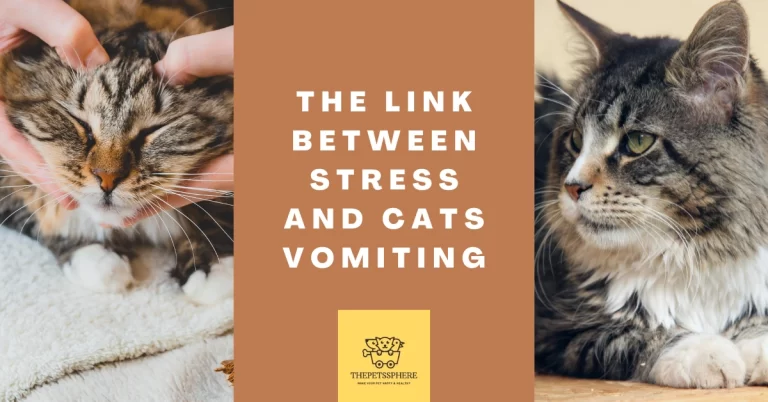Cats are beloved members of many households. However, while they are generally known for their cleanliness and overall good health, cats can suffer from various medical ailments, including vomiting. Various factors, including stress, can cause vomiting in cats. This article will explore the link between stress and cat vomiting.
What is stress in humans?
Stress is a feeling of emotional or physical tension. It can be caused by various factors, ranging from external events, such as an abusive relationship or the death of a loved one, to internal events, such as worrying about an upcoming exam or the future in general. Stress affects physical and mental health and can lead to serious medical complications if left unchecked.
What is stress in cats – how is it different from humans?

Animals also experience stress; however, they show it differently than humans. Cats, in specific, do not express emotions as humans do, but they become distant.
How does stress affect cats?
When cats experience stress, their bodies produce hormones that trigger a fight-or-flight response. This response causes changes in the body’s physiology, including increased heart rate, blood pressure, and adrenaline production. In addition to these physical responses, cats may exhibit behavioral changes such as hiding or becoming more vocal than usual.
How does stress lead to vomiting?
Cats’ bodies are incredibly sensitive to stress hormones; even small changes in hormone levels can cause physical reactions such as vomiting. This happens because stress hormones can affect the cat’s digestive system, making it swollen or irritated. This inflammtion in the stomach and intestines can lead to vomiting.
Also, when cats are stressed, they can have digestive problems that may result in feeling sick and throwing up as their bodies try to eliminate any harmful substances they have eaten.
Signs that your cat is stressed
Your cat will start behaving a bit differently when it is stressed. Here are a couple of signs that you can look out for to identify whether your cat is under stress or not:
- Being distant and hiding
- Eating too much or too little
- Growling, hissing, and meowing a lot
- Vomiting or diarrhea
- Seeming tense and crouching
- Intolerance of people
- Scratching furniture
- Hesitance when using the litter
- Swallowing and licking their nose a lot

Common causes of stress in cats
Several common causes of stress in cats can lead to vomiting. These include:
1. Changes in routine
Cats are creatures of habit, and sudden changes in their environment or routine can cause them significant amounts of stress, leading to vomiting.
2. Separation anxiety
When cats become separated from their owners for long periods, they may experience separation anxiety, leading to increased stress levels and vomiting.
3. New pets or people
Introducing new pets or people into a household can be stressful for cats; this is especially true if they are not used to these new additions or feel threatened by them in any way.
4. Moving or traveling
Moving homes or traveling with cats can also be stressful for them; this is because they will be exposed to new environments that may be unfamiliar and overwhelming for them.
5. Illness and injury
Illness or injury can also cause significant amounts of stress in cats because they will feel uncomfortable due to pain or discomfort associated with their condition.
6. Loud noises and bright lights
Loud noises and bright lights may also cause distress in some cats because these stimuli may seem overwhelming and cause them great anxiety.
7. Poor nutrition
Poor nutrition could also increase cat stress levels. Poor nutrition leads to decreased energy levels, decreased mental alertness, and an inability to cope with stressful situations effectively.
How to reduce stress levels in cats
There are several ways owners can reduce the amount of stress their cat experiences daily:
1. Provide plenty of stimulation
Ensure your cat has plenty of toys available at all times so they have something interesting to do when bored; additionally, provide your cat with plenty of places where they feel safe (e.g., perches on windowsills).

2. Create a safe space
Create an area where your cat always feels safe (e.g., a room with comfortable furniture). Ensure that this area has no loud noises or bright lights so your cat feels secure when resting during stressful times such as thunderstorms or fireworks displays).
3. Spend quality time with your cat
Spend quality time playing with your cat each day so they don’t become bored; additionally, try grooming your cat regularly (e.g., brushing fur) so they feel relaxed while being touched by you (this helps build trust).
4. Provide nutritious meals
Make sure your cat receives regular meals consisting of only high-quality ingredients so they get all the nutrients needed for good health; additionally, make sure fresh water is always available so dehydration does not become an issue during times when food intake decreases due to sicknesses like diarrhea resulting from stress-related factors such as poor digestion caused by high levels cortisol (a hormone released when stressed).
Wrapping up
In conclusion, stress can lead to cat vomiting due to the physiological and behavioral changes it causes in cats. Common causes of stress in cats include changes in routine, separation anxiety, new pets/people, moving/traveling, illness/injury, loud noises/bright lights, and poor nutrition.
To reduce cat stress levels, owners should provide plenty of stimulation, create a safe space, spend quality time with their cats, and provide nutritious meals.
By understanding the link between stress and cat vomiting, owners can reduce their cat’s stress levels and improve their overall health and well-being.

